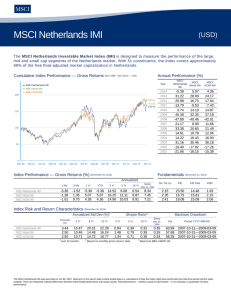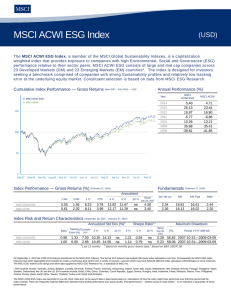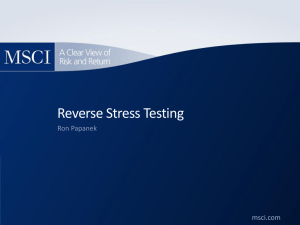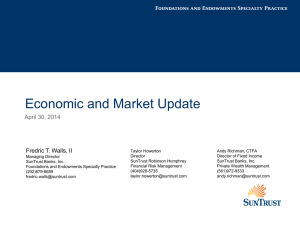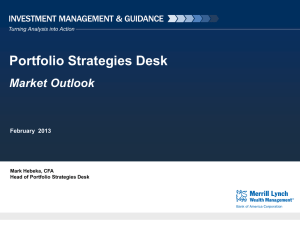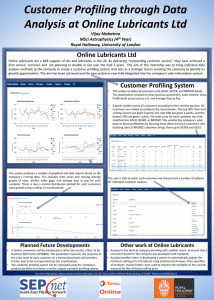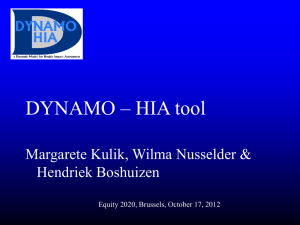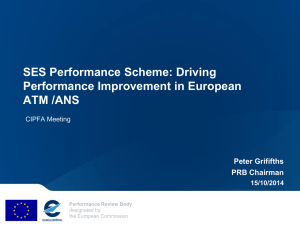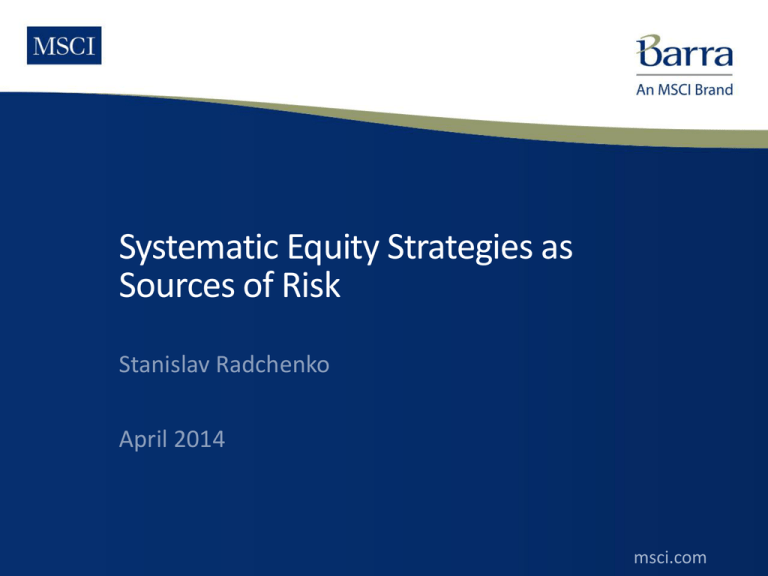
Systematic Equity Strategies as
Sources of Risk
Stanislav Radchenko
April 2014
msci.com
msci.com
©2014 MSCI Inc. All rights reserved.
1
Systematic Equity Strategies Proxy For Crowded Trades
©2014 MSCI Inc. All rights reserved.
msci.com
2
Agenda
What are Systematic Equity Strategies (SES)?
SES and crowding
Risk implications of SES: Selected Examples
Risk forecasting benefits of SES
Conclusions
©2014 MSCI Inc. All rights reserved.
msci.com
3
Systematic Equity Strategies
“Systematic Equity Strategies” (SES) refer to the
systematic (i.e., computer-based or rules-based)
implementation of fundamental or technical equity
investment anomalies & strategies
Motivated by investment or economic insight
Documented in academic finance literature
Have a wide following among finance professionals
©2014 MSCI Inc. All rights reserved.
msci.com
4
What are They?
Composite of factors represents underlying strategy
©2014 MSCI Inc. All rights reserved.
msci.com
5
Systematic Equity Strategies in US
New Factors
Short Description
Earnings Quality
Composite of cash earnings, accruals, variability in sales
Profitability
Composite of profit margin, EBITDA/EV, ROA, and ROE
Asset Turnover
Sales over total assets
Sentiment
Composite of consensus estimate revisions and analyst rating changes
Seasonality
Heston-Sadka seasonality
Prospect
Composite of skewness, lottery, and drawdown
Industry Momentum
6 month GICS sub-industry momentum (20 day half life)
Long-Term Reversal
4 year reversal in stock returns excluding last 13 months
Short-Term Reversal
1 month reversal in stock returns
©2014 MSCI Inc. All rights reserved.
msci.com
6
Systematic Equity Strategy Performance in US
Most SES experienced negative performance during quant crisis of 2007
©2014 MSCI Inc. All rights reserved.
msci.com
7
Good Proxy For Crowded Trades - Japan
©2014 MSCI Inc. All rights reserved.
msci.com
8
Good Proxy For Crowded Trades – Emerging Markets
©2014 MSCI Inc. All rights reserved.
msci.com
9
Risk Implication of
Systematic Equity
Strategies –
Selected Examples
msci.com
msci.com
©2014 MSCI Inc. All rights reserved.
10
Market & Profitability in US
Profitability is negative correlation with the market
©2014 MSCI Inc. All rights reserved.
msci.com
11
Prospect Factor Performance (by Selected Countries)
Long firms with high prospect scores, short firms with low prospect scores
©2014 MSCI Inc. All rights reserved.
msci.com
12
Prospect Factor Risk (by Selected Countries)
Volatility spiked during the financial crisis period
©2014 MSCI Inc. All rights reserved.
msci.com
13
Short Term Reversal (by Selected Countries)
Long firms with poor recent performance, short firms with strong recent
performance
©2014 MSCI Inc. All rights reserved.
msci.com
14
Small Cap vs. Total Market Value Factor
Value factor performance started to diverge during early 2007
©2014 MSCI Inc. All rights reserved.
msci.com
15
Tail Risk Factors: Slow Composite
“Slow” factors in the composite use estimation window of 126 – 252 days excluding most recent
2 months
Going long stock with high tail risk estimates
1.
Lower partial moment: stock returns volatility conditional on stock return to be below a
certain threshold
Total stock returns and specific returns
2.
Hybrid tail covariance risk: covariance of stock returns with the market conditional on stock
return to be below a certain threshold
Total returns and specific returns
3.
Downside Beta: covariance of stock returns with the market conditional on market return to
be below a certain threshold
4.
Coskewness
©2014 MSCI Inc. All rights reserved.
msci.com
16
Tail Risk Factors: Slow Composite Results (PRELIMINARY)
Univariate Quantile Performance
Multivariate Performance
TCOMP-XO
TCOMP-XO Mean Portfolio Returns, Annualized %
3
0.35
2
0.3
1
0
0.25
-1
-2
0.2
-3
1
2
3
4
5
0.15
Historical Returns
0.5
0.1
0
0.05
Bottom Quantile
Top Quantile
0
-0.05
1992
-0.5
1995
1997
2000
2002
2005
2007
2010
2012
2015
-1
1994
1996
1998
2000
2002
2004
2006
2008
2010
2012
2014
Multivariate performance (IR):
Daily cross-sectional regressions:
IR = 1.10
Monthly cross-sectional regressions: IR = 1.14
©2014 MSCI Inc. All rights reserved.
msci.com
17
Tail Risk Factors: Fast Composite
“Fast” factors in the composite use estimation window of < 42 days
Going long stock with high tail risk estimates
‘Fast’ lower partial moment: stock returns volatility conditional on stock
return to be below a certain threshold
Total stock returns and specific stock returns
Reversal effect for ‘fast’ tail risk composite
©2014 MSCI Inc. All rights reserved.
msci.com
18
Tail Risk Factors: Fast Composite Results (PRELIMINARY)
Univariate Quantile Performance
Multivariate Performance
TCOMP-FAST-XO
TCOMP-Fast-XO Mean Portfolio Returns, Annualized %
0.1
3
2
0
1
0
-0.1
-1
-0.2
-2
-3
-0.3
1
2
3
-0.4
4
5
Historical Returns
1
Bottom Quantile
-0.5
Top Quantile
0.5
-0.6
0
-0.7
-0.5
-0.8
1992
1995
1997
2000
2002
2005
2007
2010
2012
2015
-1
1994
1996
1998
2000
2002
2004
2006
2008
2010
2012
2014
Multivariate performance (IR):
Daily cross-sectional regressions:
IR = -2.94
Monthly cross-sectional regressions: IR = -1.34
©2014 MSCI Inc. All rights reserved.
msci.com
19
Systematic Equity
Strategies – Risk
Forecasting
Benefits
msci.com
msci.com
©2014 MSCI Inc. All rights reserved.
20
Use Alternative Models to Isolate Benefits
Naïve Model excludes
all of SES factors and
uses standard
risk/control factors
Standard Model
excludes SES factors
except for Stock
Momentum and
Value
SES Model includes all
of the SES factors
©2014 MSCI Inc. All rights reserved.
msci.com
21
Risk Prediction & SES Factors
Interested in models’ risk predictions for the following three managers:
Manager I: Valuation Strategy
Manager II: Valuation & Momentum Strategy
Manager III: Valuation, Momentum, Sentiment & Quality Strategy
©2014 MSCI Inc. All rights reserved.
msci.com
22
Manager I
SES Model Improved Risk Forecasts I
Persistent under prediction of strategy risk using Naïve (46%) and Standard
(19%) risk models
©2014 MSCI Inc. All rights reserved.
msci.com
23
Manager II
SES Model Improved Risk Forecasts II
Persistent under prediction of strategy risk using Naïve (41%) and Standard
(18%) risk models
©2014 MSCI Inc. All rights reserved.
msci.com
24
Manager III
SES Model Improved Risk Forecasts III
Persistent under prediction of strategy risk using Naïve (41%) and Standard
(32%) risk models
©2014 MSCI Inc. All rights reserved.
msci.com
25
SES Model Improved Risk Forecasts IV
Significant under prediction of portfolio risk using Naïve or
Standard risk models
©2014 MSCI Inc. All rights reserved.
msci.com
26
Conclusions
Systematic Equity Strategies may be used to measure exposure
to potentially crowded factors/trades
SES factors offer useful economic insights about portfolio risk
SES improve risk forecasts of portfolio managers that tilt on
these strategies
©2014 MSCI Inc. All rights reserved.
msci.com
27
MSCI 24 Hour Global Client Service
Americas
Europe, Middle East & Africa
Asia Pacific
Americas
1.888.588.4567 (toll free)
Cape Town
+27.21.673.0100
China North
10800.852.1032 (toll free)
Atlanta
+1.404.551.3212
Frankfurt
+49.69.133.859.00
China South
10800.152.1032 (toll free)
Boston
+1.617.532.0920
Geneva
+41.22.817.9777
Hong Kong
+852.2844.9333
Chicago
+1.312.706.4999
London
+44.20.7618.2222
Seoul
00798.8521.3392 (toll free)
Monterrey
+52.81.1253.4020
Milan
+39.02.5849.0415
Singapore
800.852.3749 (toll free)
Montreal
+1.514.847.7506
Paris
0800.91.59.17 (toll free)
Sydney
+61.2.9033.9333
New York
+1.212.804.3901
Taiwan
008.0112.7513 (toll free)
San Francisco
+1.415.836.8800
Tokyo
+81.3.5226.8222
São Paulo
+55.11.3706.1360
Stamford
+1.203.325.5630
Toronto
+1.416.628.1007
clientservice@msci.com | www.msci.com
msci.com
msci.com
©2014 MSCI Inc. All rights reserved.
28
Notice and Disclaimer
This document and all of the information contained in it, including without limitation all text, data, graphs, charts (collectively, the “Information”) is the property of MSCI Inc. or its subsidiaries
(collectively, “MSCI”), or MSCI’s licensors, direct or indirect suppliers or any third party involved in making or compiling any Information (collectively, with MSCI, the “Information Providers”)
and is provided for informational purposes only. The Information may not be reproduced or redisseminated in whole or in part without prior written permission from MSCI.
The Information may not be used to create derivative works or to verify or correct other data or information. For example (but without limitation), the Information may not be used to create
indices, databases, risk models, analytics, software, or in connection with the issuing, offering, sponsoring, managing or marketing of any securities, portfolios, financial products or other
investment vehicles utilizing or based on, linked to, tracking or otherwise derived from the Information or any other MSCI data, information, products or services.
The user of the Information assumes the entire risk of any use it may make or permit to be made of the Information. NONE OF THE INFORMATION PROVIDERS MAKES ANY EXPRESS OR IMPLIED
WARRANTIES OR REPRESENTATIONS WITH RESPECT TO THE INFORMATION (OR THE RESULTS TO BE OBTAINED BY THE USE THEREOF), AND TO THE MAXIMUM EXTENT PERMITTED BY
APPLICABLE LAW, EACH INFORMATION PROVIDER EXPRESSLY DISCLAIMS ALL IMPLIED WARRANTIES (INCLUDING, WITHOUT LIMITATION, ANY IMPLIED WARRANTIES OF ORIGINALITY,
ACCURACY, TIMELINESS, NON-INFRINGEMENT, COMPLETENESS, MERCHANTABILITY AND FITNESS FOR A PARTICULAR PURPOSE) WITH RESPECT TO ANY OF THE INFORMATION.
Without limiting any of the foregoing and to the maximum extent permitted by applicable law, in no event shall any Information Provider have any liability regarding any of the Information for
any direct, indirect, special, punitive, consequential (including lost profits) or any other damages even if notified of the possibility of such damages. The foregoing shall not exclude or limit any
liability that may not by applicable law be excluded or limited, including without limitation (as applicable), any liability for death or personal injury to the extent that such injury results from the
negligence or wilful default of itself, its servants, agents or sub-contractors.
Information containing any historical information, data or analysis should not be taken as an indication or guarantee of any future performance, analysis, forecast or prediction. Past
performance does not guarantee future results.
None of the Information constitutes an offer to sell (or a solicitation of an offer to buy), any security, financial product or other investment vehicle or any trading strategy.
You cannot invest in an index. MSCI does not issue, sponsor, endorse, market, offer, review or otherwise express any opinion regarding any investment or financial product that may be based
on or linked to the performance of any MSCI index.
MSCI’s indirect wholly-owned subsidiary Institutional Shareholder Services, Inc. (“ISS”) is a Registered Investment Adviser under the Investment Advisers Act of 1940. Except with respect to any
applicable products or services from ISS (including applicable products or services from MSCI ESG Research, which are provided by ISS), neither MSCI nor any of its products or services
recommends, endorses, approves or otherwise expresses any opinion regarding any issuer, securities, financial products or instruments or trading strategies and neither MSCI nor any of its
products or services is intended to constitute investment advice or a recommendation to make (or refrain from making) any kind of investment decision and may not be relied on as such.
The MSCI ESG Indices use ratings and other data, analysis and information from MSCI ESG Research. MSCI ESG Research is produced by ISS or its subsidiaries. Issuers mentioned or included in
any MSCI ESG Research materials may be a client of MSCI, ISS, or another MSCI subsidiary, or the parent of, or affiliated with, a client of MSCI, ISS, or another MSCI subsidiary, including ISS
Corporate Services, Inc., which provides tools and services to issuers. MSCI ESG Research materials, including materials utilized in any MSCI ESG Indices or other products, have not been
submitted to, nor received approval from, the United States Securities and Exchange Commission or any other regulatory body.
Any use of or access to products, services or information of MSCI requires a license from MSCI. MSCI, Barra, RiskMetrics, IPD, ISS, FEA, InvestorForce, and other MSCI brands and product
names are the trademarks, service marks, or registered trademarks of MSCI or its subsidiaries in the United States and other jurisdictions. The Global Industry Classification Standard (GICS) was
developed by and is the exclusive property of MSCI and Standard & Poor’s. “Global Industry Classification Standard (GICS)” is a service mark of MSCI and Standard & Poor’s.
© 2014 MSCI Inc. All rights reserved.
Jan 2014
msci.com
msci.com
©2014 MSCI Inc. All rights reserved.
29

